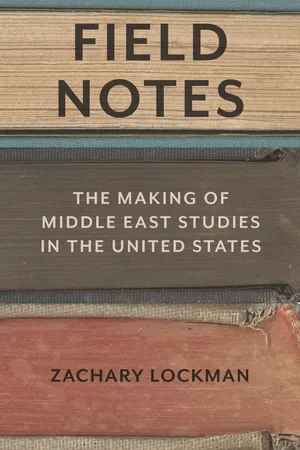
- 376 pages
- English
- ePUB (mobile friendly)
- Available on iOS & Android
About this book
Field Notes reconstructs the origins and trajectory of area studies in the United States, focusing on Middle East studies from the 1920s to the 1980s. Drawing on extensive archival research, Zachary Lockman shows how the Carnegie, Rockefeller, and Ford foundations played key roles in conceiving, funding, and launching postwar area studies, expecting them to yield a new kind of interdisciplinary knowledge that would advance the social sciences while benefiting government agencies and the American people. Lockman argues, however, that these new academic fields were not simply a product of the Cold War or an instrument of the American national security state, but had roots in shifts in the humanities and the social sciences over the interwar years, as well as in World War II sites and practices.
This book explores the decision-making processes and visions of knowledge production at the foundations, the Social Science Research Council, and others charged with guiding the intellectual and institutional development of Middle East studies. Ultimately, Field Notes uncovers how area studies as an academic field was actually built—a process replete with contention, anxiety, dead ends, and consequences both unanticipated and unintended.
Frequently asked questions
- Essential is ideal for learners and professionals who enjoy exploring a wide range of subjects. Access the Essential Library with 800,000+ trusted titles and best-sellers across business, personal growth, and the humanities. Includes unlimited reading time and Standard Read Aloud voice.
- Complete: Perfect for advanced learners and researchers needing full, unrestricted access. Unlock 1.4M+ books across hundreds of subjects, including academic and specialized titles. The Complete Plan also includes advanced features like Premium Read Aloud and Research Assistant.
Please note we cannot support devices running on iOS 13 and Android 7 or earlier. Learn more about using the app.
Information
Table of contents
- Cover
- Copyright
- Title Page
- Contents
- Acknowledgments
- Preface
- 1. “We Shall Have to Understand It”
- 2. “The Regional Knowledge Now Required”
- 3. Launching a New Field
- 4. Princeton, the ACLS and Postwar Near Eastern Studies
- 5. A Committee for the Near and Middle East
- 6. Field-Building in Boom Times
- 7. “A Need for More Regular Contact”
- 8. “The Lower Parts of Max Weber”
- Epilogue
- Notes
- Bibliography
- Index